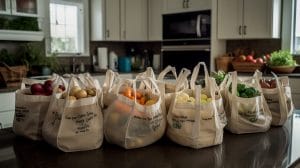Introduction to Plastic-Free Swaps for a Sustainable Lifestyle
The global environment is under increasing pressure from plastic waste, prompting a global shift towards a more sustainable lifestyle. Single-use plastic, ubiquitous in our daily lives, has caused considerable plastic pollution, resulting in a detrimental impact on not only wildlife and the environment, but human health as well. Expounding upon plastic-free swaps, these novel initiatives and lifestyle changes encourage a shift from disposable items to reusable or biodegradable alternatives. This fundamental swap, crucial for a sustainable lifestyle, empowers individuals to reduce their plastic usage and ultimately, the amount of plastic that ends up in landfills.
Here are some of the most prevalent swap options that anyone can make in their day-to-day lives. Firstly, ditch plastic straws for sustainable alternatives like bamboo straws. These straws are not only biodegradable but are also easy to clean and reuse. Next, swap your shampoo and conditioner bottles for more eco-friendly shampoo and conditioner bars. These bars accomplish the same cleansing action while excluding plastic bottles often ending up as plastic waste. One of the significant contributors to plastic pollution is plastic bags. These disposable items can be swapped for reusable grocery bags made of organic cotton or bags made with other sustainable materials.
Another easy swap is to opt for a bamboo toothbrush instead of a plastic toothbrush and replace single-use water bottles with reusable water bottles. Lastly, silicone alternatives to plastic wrap, such as beeswax wraps provide excellent alternatives to single-use plastic items, and silicone items are dishwasher-safe. The adoption of such zero-waste swaps and the use of less plastic contribute towards a plastic-free, sustainable lifestyle. By making these simple swaps, we can drastically reduce our reliance on plastic and take strides towards a more sustainable future.
Simple Swaps You Can Make: From Single-Use Plastic to Sustainable Alternatives
 The escalating concerns surrounding the detrimental effects of single-use plastic on our environment have necessitated the evolution towards more sustainable alternatives. With an annual increase of millions of plastic items – from disposable plastic cutlery to single-use plastic bottles – ending up in landfills, it becomes imperative for us to take immediate action to reduce plastic waste.
The escalating concerns surrounding the detrimental effects of single-use plastic on our environment have necessitated the evolution towards more sustainable alternatives. With an annual increase of millions of plastic items – from disposable plastic cutlery to single-use plastic bottles – ending up in landfills, it becomes imperative for us to take immediate action to reduce plastic waste.
Initiating the transition can be as easy as making simple swaps in our daily lives. For instance, instead of plastic plates and containers, we can opt for glass containers, which are not just dishwasher friendly but also longer-lasting and a healthier choice. Incorporating the use of compostable dishware and utensils made from plant-based materials leaves a lesser environmental footprint. And switching from convenient, disposable coffee cups to reusable coffee mugs can make a significant dent in the staggering number of coffee cups that go to waste.
In addition to the foregoing, consider using loose-leaf tea instead of tea bags that are made from plastic, or substituting disposable shopping bags for reusable silicone bags. Both of these swaps enable us to avoid a lot of plastic that would traditionally be destined for landfills. Additionally, infrared options such as washing machine-friendly, reusable wipes are a great alternative to disposable ones that typically come in plastic. More personal switch options include substituting single-use shampoo bars for traditional plastic containers, going for the rising trend of reusable coffee cups, and switching to paper bags or other recyclable materials instead of plastic packaging. Within the reach of these 10 sustainable steps, you are well set up to embark on a more sustainable life. Embrace the transitions, even if it’s one move at a time, and soon enough you’ll realize that simple, plastic-free swaps are not only healthier for our environment, but are also friendlier to your wallet.
The Importance of Plastic Free July: Encouraging Less Plastic Usage through Eco-friendly Alternatives
Understanding the significance of Plastic Free July is crucial in combating the global plastic waste crisis. This worldwide initiative advocates for less plastic usage, instead encouraging the adoption of eco-friendly alternatives that are kinder to our planet. Our dependency on single-use plastics has led to unprecedented environmental degradation; millions of these non-degradable items are discarded carelessly each year, creating a hazardous situation for the Earth and its inhabitants. However, by incorporating more sustainable practices into our daily lives, such as recycling and composting, we can begin to reverse this damaging trend. Just think – by merely replacing single-use plastic with sustainable alternatives, we are making a significant difference.
- Switch to reusable water bottles instead of using plastic ones.
- Opt for cloth bags instead of plastic grocery bags.
- Make use of compostable paper cups rather than plastic or Styrofoam cups.
A noteworthy aspect of Plastic Free July is the encouragement of companies to embark on this green journey, with many opting for plastic-free packaging. A simple look at how tea bags are made unveils the surprising use of plastic in their manufacture, which can be reduced or eliminated through innovation and commitment to sustainability. As such, consumers are empowered to support those companies that have made the switch to more environmentally friendly alternatives in an effort to cultivate a greener, cleaner planet for future generations.
- Choose products with sustainable, recyclable packaging.
- Support companies that have made the switch to green alternatives.
- Encourage others to participate in Plastic Free July and adopt more eco-friendly habits.
Zero Waste Swap: Switching from Plastic Straws to Bamboo and from Plastic Water Bottles to Reusable Water Bottles
 The modern socio-environmental challenge of single-use plastic has been actively addressed by adopting sustainable alternatives to single-use plastic items. A noteworthy example is the zero waste swap initiative, specifically, the switch from plastic straws to bamboo straws, and from plastic water bottles to reusable water bottles.
The modern socio-environmental challenge of single-use plastic has been actively addressed by adopting sustainable alternatives to single-use plastic items. A noteworthy example is the zero waste swap initiative, specifically, the switch from plastic straws to bamboo straws, and from plastic water bottles to reusable water bottles.
This not only aligns with our environmental responsibility but also helps simplify daily consumption patterns. Bamboo straws form a unique combination of being ecologically sensitive and user-friendly. They are naturally antibacterial and biodegradable, making them an excellent choice. In contrast, plastic straws, often unnoticed, pose a significant environmental hazard, ending up in our oceans and contributing to the millions of plastic waste deposited annually.
Reusable water bottles bear a similar narrative. Moving away from the conventional practice of using plastic water bottles, the rise of reusable water bottles has made a significant impact on reducing plastic waste. The advantages are multifold:
- They reduce the reliance on single-use plastic containers, thereby minimizing plastic waste.
- Reusable bottles often come with insulation properties, keeping your water at the desired temperature for hours.
- They’re cost-effective in the long run as you don’t need to continuously buy bottled water.
In essence, by making these swaps, we are encouraging the transition to a more sustainable lifestyle while keeping a check on the million plastic items that could potentially harm our environment. Thus, the zero waste swap initiative reaffirms the philosophy that our everyday choices play an instrumental role in the larger framework of environmental conservation.
Bathroom Swaps: Changing to Bamboo Toothbrushes, Plastic-Free Shampoo, and Cotton Buds
As we continue our collective journey towards greater environmental consciousness, one of the areas where we can make a considerable impact is in our bathrooms. Simple swaps, such as trading traditional items for their environmentally friendly counterparts, can reduce our personal contribution to the global issue of single-use plastic pollution. Among these sustainable alternatives circling the ecological space are bamboo toothbrushes, plastic-free shampoo, and cotton buds, choices that have the best interest of our planet at their heart.
Firstly, switching to bamboo toothbrushes can significantly cut down the amount of plastic waste generated in your bathroom; these toothbrushes are biodegradable and come packaged without any harmful plastic. Next is the replacement of bottled shampoos with plastic-free alternatives such as shampoo bars. Not only are they convenient and great for travel, but they also last longer and discard the need for plastic containers. Lastly, cotton buds, more commonly known as cotton swabs, can also be replaced with ones that have bamboo or paper sticks instead of plastic. This straightforward modification removes yet another source of single-use plastic from our lives while maintaining the same level of functionality and comfort. All these steps, taken together or even individually, move us closer to a more sustainable planet.
Kitchen Swaps: Adopting Alternatives like Beeswax Wraps and Reusable Grocery Bags
 The rise of environmental consciousness has encouraged a shift towards sustainable alternatives in our daily habits, remarkably within our kitchen practices. Beeswax wraps have emerged as a popular eco-friendly replacement for single-use plastic, such as cling film and sandwich bags. These wraps are made from organic cotton soaked in beeswax, jojoba oil, and tree resin, which are all biodegradable materials.
The rise of environmental consciousness has encouraged a shift towards sustainable alternatives in our daily habits, remarkably within our kitchen practices. Beeswax wraps have emerged as a popular eco-friendly replacement for single-use plastic, such as cling film and sandwich bags. These wraps are made from organic cotton soaked in beeswax, jojoba oil, and tree resin, which are all biodegradable materials.
Aside from being sustainable, they are also reusable and offer various benefits like maintaining the freshness of food longer and eliminating exposure to the harmful elements found in plastics.
Another essential switch in the kitchen is the use of reusable grocery bags instead of single-use plastic bags. These bags come in a variety of materials such as canvas, cotton, and even recycled plastic. Not only do they reduce your plastic footprint, but they are also more durable and can carry heavier loads than their plastic counterparts. Here are some benefits of using reusable grocery bags:
- They are sturdy and reliable: unlike single-use bags that can easily tear.
- They are cost-effective: despite their slightly higher initial cost, they last much longer.
- They can carry more items: due to their strength and durability.
Embracing these kitchen swaps not only benefits our environment through waste reduction but also promotes a healthier lifestyle by minimizing our exposure to harmful plastics.
Key Takeaways and Next Steps to Use Less Plastic and Embrace Sustainable Living
Embracing sustainable living and reducing our reliance on single-use plastic is a pivotal step towards preserving our planet for future generations. The plastic waste crisis is escalating, severely impacting marine life and contaminating our food chain. Thus, understanding how to use less plastic is an integral part of leading a more eco-friendly life. The key takeaways for a sustainable living approach include understanding the detrimental effects of plastic pollution, rewarding businesses that prioritize sustainability, and making conscious efforts to reduce, reuse, and recycle plastic, optimizing for products packaged in glass, metal, or cardboard, and finally, spreading awareness amongst friends, family, and the wider community.
Shifting towards the next steps to implement these strategies, it’s crucial to organize attainable, measurable goals and prioritize actions that have the most significant impact. First and foremost, individuals can examine their daily routines to identify points where they can substitute single-use plastic products with more sustainable alternatives. Small changes, such as carrying a reusable water bottle, shopping with cloth bags, avoiding items with unnecessary plastic packaging at the grocery store, and choosing items that are made from recycled materials, can make a substantial difference.
Further, taking an active role in community cleanups and enlightening others about the dangers of plastic pollution can enhance collective understanding and efforts. The journey towards a plastic-free lifestyle is certainly challenging, but consistent efforts and community engagement can lead to substantial environmental improvements. By making these small, conscious changes in our daily lives and encouraging others to do the same, we can collectively move towards a more sustainable future, where the health of our planet and its ecosystems are prioritized.
Conclusion
In conclusion, the environmental impact and drastic consequences associated with the widespread use of single-use plastic are undeniable. This type of plastic, geared for discard right after use, has not only produced immense environmental harm but has also contributed significantly to the global plastic pollution crisis. This crisis, palpable in our oceans and wildlife, demands immediate and decisive action. We must advocate for and implement sustainable alternatives and stringent recycling practices, highlighting the importance of reducing our reliance on single-use plastic. This can range from adopting reusable shopping bags to opting for glass or stainless steel containers instead of plastic bottles.
Systemic changes are also integral to this cause, and they necessitate the involvement and commitment of both corporations and governments. Through wide-reaching campaigns, increased awareness, and education, society can begin to understand the full breadth of the single-use plastic problem and strive towards a more environmentally friendly lifestyle. Encouragingly, the journey to eradicate single-use plastic and transform our throwaway culture is not impossible, nor is it out of reach. It is an achievable goal, but it requires collective action, individual responsibility, governmental regulations, corporate responsibility, and above all, a sustained approach.
Ultimately, every single action to reduce single-use plastic counts and brings us one step closer to a more sustainable and cleaner world. Together, we can make this pursuit a reality. Let’s take action today for a healthier tomorrow.
FAQ’s:
Q1. What are single-use plastics?
A1. Single-use plastics are disposable items made from plastic, such as plastic bags, straws, and bottles, that are used once and then thrown away.
Q2. What are some sustainable alternatives to single-use plastics?
A2. Sustainable alternatives to single-use plastics include reusable bags, metal straws, and glass or stainless steel bottles.
Q3. How can I reduce my use of single-use plastics?
A3. You can reduce your use of single-use plastics by using reusable bags, metal straws, and glass or stainless steel bottles instead.
Q4. What are the environmental impacts of single-use plastics?
A4. Single-use plastics have a negative environmental impact, as they are not biodegradable and can take hundreds of years to break down.
Q5. What are the benefits of using sustainable alternatives to single-use plastics?
A5. The benefits of using sustainable alternatives to single-use plastics include reducing waste, conserving resources, and protecting the environment.
Q6. What are some easy swaps to replace single-use plastics?
A6. Some easy swaps to replace single-use plastics include using reusable bags, metal straws, and glass or stainless steel bottles.
Q7. How can I make my home more sustainable by replacing single-use plastics?
A7. You can make your home more sustainable by replacing single-use plastics with reusable bags, metal straws, and glass or stainless steel bottles.

Sanela Isakov
Sanela is a passionate advocate for environmentally conscious living. With a background in environmental science, she brings a wealth of knowledge to our community, inspiring readers to make sustainable choices in their daily lives. Join Sanela on a journey toward a greener, more sustainable future.



